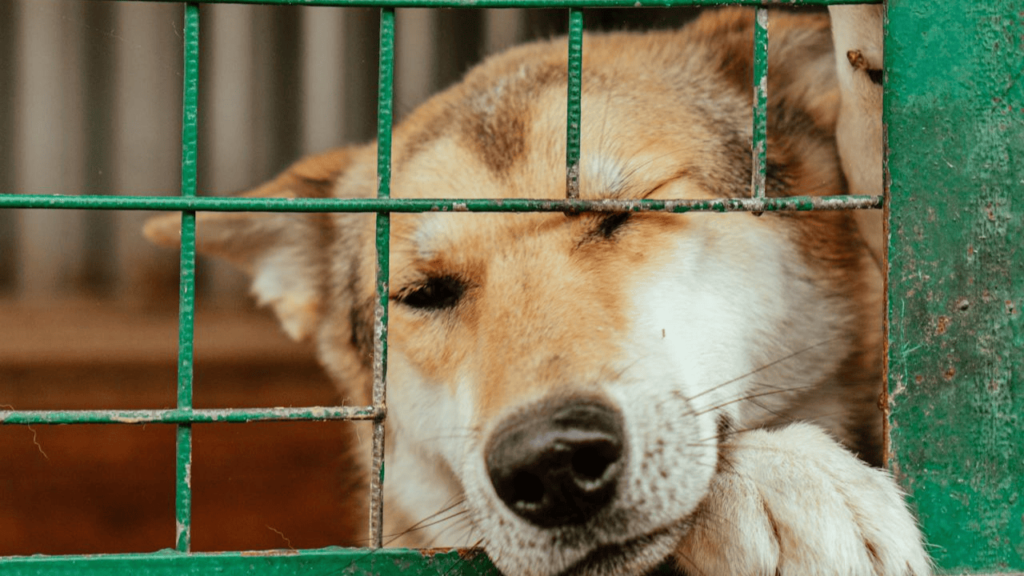Facing animal abuse or neglect charges? Learn about penalties, state vs. federal laws, and how Cook Attorneys in Virginia can fight for your rights and protect your future.
Table of Contents
Can You Go To Jail For Animal Cruelty in Virginia?
What is the Difference Between Animal Cruelty and Neglect?
What Are the Differences Between State and National Laws on Animal Cruelty?
What Should I Do if I Have Animal Abuse Charges?
Can You Go To Jail For Animal Cruelty in Virginia?
Yes, you can go to jail for animal cruelty in Virginia. The state enforces strict laws under Virginia Code § 3.2-6570, which criminalize cruelty, neglect, and intentional harm to animals. Whether an offender faces jail time depends on the severity of the crime and whether the charges are classified as a misdemeanor or felony. Below is a breakdown of these classifications and their associated penalties.
Penalties for Animal Cruelty in Virginia
- Class 1 Misdemeanor:
- Offense: Acts of cruelty, neglect, or abandonment that do not result in serious injury or death to the animal.
- Penalty: Up to 12 months in jail and/or a fine of up to $2,500.
- Class 6 Felony:
- Offense: Maliciously killing or torturing an animal, causing death, or inflicting severe pain and suffering.
- Penalty: 1 to 5 years in prison (or, at the court’s discretion, up to 12 months in jail and/or a fine of $2,500).
Aggravating Factors That Increase Penalties
- Intentional Harm: Acts of malicious cruelty often escalate charges from a misdemeanor to a felony.
- Neglect Resulting in Death or Severe Injury: Cases of neglect that lead to the death or serious physical harm to an animal are often treated as felonies.
- Repeat Offenders: Individuals with prior animal cruelty convictions may face enhanced penalties.
Recent Animal Cruelty Cases in Virginia
Virginia’s courts take animal abuse seriously, as seen in these recent cases:
- Patricia Mathis-Burby Case (2023): Loudoun County Animal Services found Mathis-Burby’s animals living in horrific conditions, confined in crates with little food or water. Some animals suffered from untreated injuries. Mathis-Burby was ordered to pay $23,500 in restitution, lost custody of the animals, and was permanently banned from owning pets in Virginia.
- Amissville Family Case (2024): In a shocking instance, authorities discovered 12 distressed dogs at a family home. The dogs had not been fed for approximately 1.5 weeks and had not received basic care such as vaccinations or rabies shots. The family faced 60 animal abuse charges.
Virginia’s Laws on Animal Cruelty
- Cruelty to Animals: Torturing, beating, or inflicting inhumane pain or injury on a companion animal is illegal.
- Tethering Laws: Dogs can only be continuously tethered with proper food, water, or shelter, and they must not be tethered in extreme weather conditions.
What is the difference between animal cruelty and neglect?
Animal cruelty and neglect are distinct forms of mistreatment that harm animals, but they differ in intent, action, and legal consequences. Understanding these differences is essential for recognizing and addressing these issues under Virginia law.
What is Animal Cruelty?
Animal cruelty, or abuse, involves intentional harm or malicious actions toward an animal, causing pain, suffering, or death. These acts are deliberate and often stem from personal gain, entertainment, or malice.
Examples of Animal Cruelty:
- Physical Abuse: Beating, torturing, or injuring an animal.
- Malicious Killing: Intentionally killing an animal without justification.
- Exploitation: Using animals for illegal activities like dog fighting.
- Deprivation: Denying food, water, or medical care with the intent to harm.
In legal terms, animal cruelty often requires proving intent to harm, making it a more serious offense than neglect. Cases of malicious harm can result in felony charges.
What is Animal Neglect?
Animal neglect refers to the failure to provide basic care and necessities to an animal. Unlike cruelty, neglect is often unintentional and arises from carelessness, ignorance, or inability to meet an animal’s needs. Despite the lack of intent, neglect still results in harm or endangerment.
Examples of Animal Neglect:
- Failing to provide adequate food, water, or shelter.
- Keeping animals in unsafe or unsanitary conditions (e.g., hoarding situations).
- Not seeking veterinary care for an injured or sick animal.
- Chaining an animal without access to water or protection from the elements.
Neglect is usually treated as a misdemeanor, but if it leads to serious injury or death, the charges can escalate to a felony.
What Are the Differences Between State and National Laws on Animal Cruelty?
Animal cruelty laws in the United States are enforced at both state and federal levels, with each addressing different aspects of animal welfare. Understanding these distinctions can help individuals navigate legal responsibilities and ensure proper protection for animals.
State Laws on Animal Cruelty
State laws govern animal cruelty within the borders of a specific state. Each state establishes its own legal definitions, penalties, and enforcement procedures for acts of cruelty, neglect, or abuse. These laws are typically broad, covering various scenarios involving domestic pets, farm animals, and sometimes wildlife. For example, state laws might include statutes for dogfighting, animal hoarding, or leaving pets in dangerously hot vehicles.
Penalties under state laws vary widely depending on the severity of the offense. Misdemeanors, which often involve minor neglect or non-malicious harm, can result in fines or short jail sentences. More serious crimes, like malicious cruelty or neglect causing severe harm, are classified as felonies and carry harsher penalties such as imprisonment and higher fines. In Virginia, for instance, the distinction between misdemeanors and felonies depends on the intent of the offender and the harm caused.
Federal Laws on Animal Cruelty
Federal laws apply across all 50 states but have a more limited scope than state laws. They typically address specific issues, such as crimes that cross state lines, occur on federal property, or impact interstate commerce.
Key federal laws include:
- The Preventing Animal Cruelty and Torture (PACT) Act (2019): Criminalizes extreme acts of cruelty, such as burning or drowning animals, especially when these acts involve federal property or interstate commerce.
- The Animal Welfare Act (AWA) (1966): Regulates the treatment of animals used in research, exhibition, and transportation, but excludes certain categories like farm animals raised for food.
- The Humane Methods of Slaughter Act (1958): Ensures livestock is slaughtered humanely in federally inspected facilities.
- The Endangered Species Act (1973): Protects endangered and threatened species from harm, exploitation, or habitat destruction.
Federal penalties are often severe, especially for crimes involving organized animal fighting, interstate commerce, or harm to protected species. Offenders may face substantial fines and lengthy prison sentences. Enforcement of federal animal cruelty laws is handled by agencies like the USDA, U.S. Fish and Wildlife Service, and the Department of Justice.
What Are the Criminal Penalties for Animal Abuse and Neglect?
The penalties for animal abuse and neglect depend on the severity of the offense, the intent of the offender, and the harm caused to the animal. These penalties are categorized into misdemeanors and felonies, with additional consequences for aggravating factors.
Misdemeanor Penalties
Misdemeanor charges typically apply to less severe cases, such as minor neglect or harm that does not result in significant injury or death. Common examples include failing to provide adequate food, water, or shelter, minor physical abuse that does not cause severe injury, and leaving a pet in a hot vehicle, provided the animal is rescued without major harm.
- Fines: Typically range from $500 to $2,500.
- Jail Time: Up to 12 months in county jail.
- Probation: Supervision with conditions, such as avoiding animals or completing educational programs.
- Community Service: Often performed at animal shelters.
Felony Penalties
Felony charges are reserved for more serious offenses involving intentional harm, severe neglect, or acts resulting in an animal’s death. Common examples include maliciously torturing, mutilating, or killing an animal, severe neglect leading to prolonged suffering or death, and participating in or organizing animal fighting, such as dogfighting or cockfighting.
- Fines: Can reach $10,000 or more, depending on the jurisdiction.
- Prison Time: Ranges from 1 to 10 years in state prison, depending on the offense.
- Lifetime Ban on Owning Animals: Courts may prohibit offenders from caring for animals permanently.
- Restitution: Offenders may be required to cover veterinary costs, care, or burial expenses.
Enhanced Penalties for Aggravating Factors
Certain factors can increase the severity of penalties:
- Repeat Offenses: Subsequent convictions often result in harsher punishments.
- Multiple Victims: Cases involving several animals, such as in hoarding situations, can lead to additional charges.
- Vulnerable Animals: Abuse of service animals or endangered species may result in elevated charges.
- Public Danger: Acts that endanger public safety, such as releasing a dangerous dog, may incur stricter penalties.
Special Considerations by Jurisdiction
- Virginia: In Virginia, animal cruelty that results in severe harm or death is a Class 6 felony, punishable by 1 to 5 years in prison (or 12 months in jail at the court’s discretion) and with fines of up to $2,500.
- Federal Penalties: Under the PACT Act, federal penalties for specific types of abuse include prison terms of up to 7 years and significant fines for offenses across state lines or on federal property.
What Should I Do if I Have Animal Abuse Charges?
Facing animal abuse or neglect charges can feel overwhelming, especially in a legal system that may seem stacked against you. This is where Cook Attorneys step in as your advocate. Based in Harrisonburg, Virginia, Cook Attorneys are experienced criminal defense lawyers who will fight for your rights and work tirelessly to protect your future. Here’s how they can help:
Why Choose Cook Attorneys?
- Fighting for Justice Under Virginia Law: Virginia’s animal abuse laws, are complicated and often harsh. Cook Attorneys have the local expertise and determination to challenge these laws on your behalf, so that every detail of your case is fully examined.
- A Defense Strategy Built Around You: The system might treat you like just another case, but Cook Attorneys take the time to understand your unique situation. We’ll build a defense strategy tailored to your case, analyzing intent, evidence, and the circumstances to fight for the best outcome.
- Relentless Negotiation: Whether negotiating reduced charges, avoiding jail time, or seeking alternative sentencing like probation or rehabilitation, Cook Attorneys will go head-to-head with prosecutors to ensure your voice is heard and your rights are protected.
- Shielding Your Rights and Reputation: Beyond the courtroom, Cook Attorneys fight to safeguard your future. We’ll help mitigate long-term consequences like restrictions on animal ownership or damage to your personal and professional reputation.
- Aggressive Courtroom Advocacy: If your case goes to trial, Cook Attorneys will stand by your side, fighting aggressively to present evidence, cross-examine witnesses, and challenge the prosecution’s claims. We’re not afraid to take on the system to seek justice for you.
Take Action Today
Don’t face these charges alone. Schedule a consultation with Cook Attorneys to take the first step in protecting your rights and future. We’ll provide you with an honest assessment of your case, explain your legal options, and fight for the justice you deserve. Contact Cook Attorneys today. When the odds feel stacked against you, you need a legal team that’s ready to fight for you.









